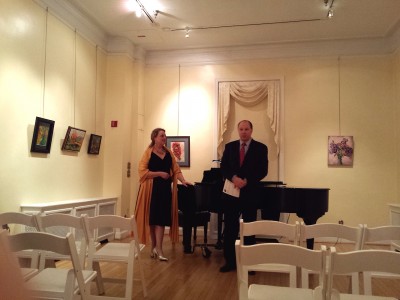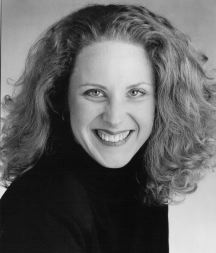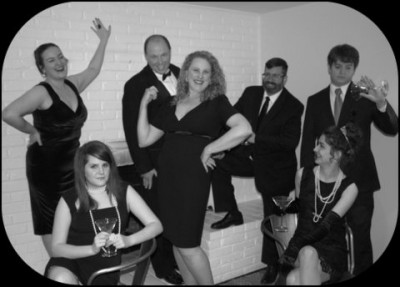As part of its First Mondays Cultural Collective Concert Series at the Kentlands Mansion, The American Center for Puccini Studies (ACPS) will present “Viva Verdi: The Beautiful Soul of Italy” on Oct. 3. Verdi is not a misprint or a change of emphasis, according to Dr. Harry N. Dunstan, the group’s founding artistic director, whose credentials include Puccini scholar, tenor, translator, coach, accompanist, musicologist and lecturer.
In fact, “Verdi made Puccini possible,” Dunstan observed, noting that Giuseppe Verdi’s seven decades (1813-1901) of achievement were remarkable; the composer of more than 25 operas was also a conductor, farmer, politician, patriot and philanthropist. “His accomplishments set the stage for Giacomo Puccini (1858-1924) both musically and culturally.”
Dunstan and managing director Kay Krekow–soprano, coach, accompanist and Dunstan’s wife–run the 12-year-old Derwood-based group that presents performances and educational programs that specialize in Puccini’s rare and lesser-known works, highlighting their spiritual and musical relevance as well as their historical context.

The Verdi program, to be sung by ACPS principal artists including Dunstan and Krekow and its Festival Chorus, will celebrate not only the composer’s music, but also his extraordinary philanthropy. “Verdi literally took care of his neighbors,” Dunstan said, pointing out that he financed “bridges, nursery schools, roads, irrigation systems, hospitals, and even a retirement home for destitute musicians (Casa di Riposa in Milan), all of which continue to benefit the citizens of 21st century Italy.” It is thus fitting that all proceeds from ticket sales for this ACPS show will benefit Children’s National Medical Center.
Dunstan and Krekow met about 20 years ago in Frederick, Md., when they were hired to play opposite each other as the lovers—singer Floria Tosca and painter Mario Cavaradossi–in Puccini’s tragic opera “Tosca.” “Puccini introduced us,” Krekow said.
“Both our voices are big,” said Krekow. “Neither of us had ever found a partner on a professional level who could keep up with us. At that first rehearsal, our attraction was first and foremost about singing together.” And then, Dunstan said, smiling, “things got out of hand.”
Although geographically miles apart, the couple’s upbringings have similarities. Dunstan is from the Tidewater, Va., area, and earned an undergraduate degree in music history and Italian studies at Old Dominion University. “I grew up in church, always singing,” he said, noting that his high school chorus teacher was also the football coach so there was no issue of singing being for sissies. Dunstan came to D.C. to work on a doctorate at The Catholic University of America. The focus of his career would become evident in 1975 when he saw a performance of Puccini’s “La Bohème.” Having heard repeated praise for the work, he recalled wondering “How good can it be?” Post-view, he was smitten, and “that was that.”

Krekow was raised on a 400-acre corn and soybean farm in Iowa, and sang in the church where her mother was the organist; since her soprano voice was always considered “too big” for the choir, she also played piano and organ. What inspired her to sing occurred at age 10; her fourth-grade music teacher took her to see “what I’m sure was a perfectly dreadful community theater production of ‘My Fair Lady.’” At Stephens College in Missouri, Krekow studied voice and saw her first opera—a National Opera Company production of Mozart’s “Marriage of Figaro.” “I found what I had been waiting for all my life. I learned that my voice was perfect for opera,” she recalled. Krekow proceeded to follow her favorite voice teachers further and further East until she, too, arrived in D.C.
“We are both drawn to Puccini and Verdi because they created characters who are real flesh and blood, very real people who have honest emotions,” Krekow said. “When I sing Puccini, I realize I am not alone: someone else has felt like me. The characters may be archetypes, but their feelings are universal, part of the human experience. We want our audience to know that this music is still relevant. People still feel this way.”
Despite the foreign language of the lyrics, Dunstan pointed out that “what separates homo sapiens is that we are inherently musical creatures—we perceive scales, tones—we’re hard-wired biologically to get it. Language is far more abstract.”
“We’re trying to get people to listen, hear the music we’re singing within themselves and (thus) learn about themselves,” Krekow said. In our concerts, the goal is “to raise people’s vibration level, let them feel something more.”

The intimacy of the Kentlands Mansion is appropriate, said Dunstan in that “many operas were designed to be performed in someone’s house, drawing room entertainment.” He and Krekow like the less formal ambiance reminiscent of a 19th century salon. “Our programs are little conversations,” Dunstan said, noting that to enhance accessibility prior to the singing, they provide program translations, explain historical context and suggest what to listen for musically.
Krekow feels fortunate to be working seven days a week “in an industry where I can do my best, where I teach and sing every day, and every day is still different. To make a living in art, you have to have the mentality that it’s this or nothing else. We’re lucky we get to do this, and do it together.”
Two studios in the couple’s Derwood home accommodate their Arcadia Vocal Academy and rehearsal space for ACPS programs. The company has 30 to 40 members with a core group of 15, all “decent people brought together by music, who take care of each other.” They socialize frequently at barbecues and games of croquet on the lawn. Everyone is on equal footing, Dunstan insisted. “We try to take the narcissism, the ego, out of it. We won’t get rich, but we’re happy to be who we are.”
A free showing of the documentary film, “Tosca’s Kiss,” about Verdi’s nursing home for retired opera singers, is set for Oct. 2, 2 to 4 p.m., at the Rockville Library, 21 Maryland Ave., Rockville.
“Viva Verdi: The Beautiful Soul of Italy” will begin at 7 p.m. Oct. 3 at Kentlands Mansion, 320 Kent Square Road, Gaithersburg. Tickets are $25. The series will continue at 7 p.m. Nov. 7 with “The REAL American Songbook,” and 7 p.m. Dec. 5 with “Manon Lescaut: Puccini’s French Mistress.” Tickets for the Nov. 7 and Dec. 5 shows are $12.
For more information on these events, visit www.pucciniamerica.org.